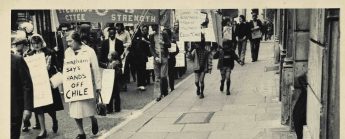Charlotte Greenhalgh is an historian of society and culture in twentieth-century Britain, Australia, and New Zealand. She has written about romance and courtship among young people, the history of old age, and participation in social science. Charlotte is currently lecturer and postdoctoral researcher at Monash University in Melbourne, Australia.
The history of emotions was a key theme of the recent Rethinking Modern British Studies conference at the University of Birmingham (#MBS2015). As Will Pooley observed in a recent blog post, multiple keynotes were structured around questions about emotions. The approach was applied to the history of informal empire and to the history of urban activism in the 1980s. The ‘History of Emotions in Modern Britain’ panel spoke to a packed room. It felt like a turning point.
Historians of emotion have spoken at British history conferences before, but usually in small numbers and to specialist audiences. Presenting my own work about how it felt to grow old in the past I have been asked, ‘but how is this history?’ This pointed question motivated me to organise a panel for #MBS2015 asking, ‘What does the history of emotions contribute to the big questions in modern British studies?’ and ‘Is it useful to the field?’ After the conference, it is clear that the answer to the second question is a resounding yes.
So what arguments do historians of emotions make about their contribution?
After the ‘History of Emotions’ panel, there was discussion about the distinction between histories that map the way that emotions have changed over time, and ‘history with emotions in it’. The first is a central activity of established historians in the field, and the focus of centres for the history of emotions that are based in Berlin, London, and across several universities in Australia. This fascinating work remains a subfield of Modern British Studies.
The second description could be used as a criticism of work that makes reference to emotion without interrogating its historical context. Yet, interpreted differently, ‘history with emotions in it’ describes the stunning historical research on display at #MBS2015 by historians such as Stephen Brooke and Deborah Cohen. This work uses the questions and methods that have been developed in the subfield to address some of the largest questions in modern British studies.
Emotions and historical method
It is difficult to access and to interpret evidence about how people felt in the past. As a result emotional experience has most often been left outside of history, in the realms of biology or psychology. Yet the field of the history of emotions has been strengthened by the requirement that historians think about their subject and its material traces with particular care, creativity, and cross-disciplinary engagement (perhaps using philosophy of mind in the way that Monique Scheer has advocated).
Taking questions about emotion to topics such as empire, politics, and old age requires us to think about historical narratives and evidence in new ways. In order to answer questions about emotions, we have to think about culture, environment, the body, and internal lives — all at the same time.
Big stories
In my own work in the history of old age, questions about emotion have drawn connections from the history of the welfare state to personal experiences, and to the ageing body and the workings of memory. This version of history links up areas of modern British history in unexpected ways. At #MBS2015 James Vernon argued that mapping big historical narratives will help us to defend the public status of history, and the working conditions of everyone involved. We can use the history of emotions to connect up public and private life within these large plotlines and to engage our readers. As many speakers at #MBS2015 showed, we can harness the history of emotions to tell big stories that also get to the heart of things.
Politics
The history of emotions explains as much about the politics and economics of modern Britain as it does about subjectivity. At #MBS2015 the panel and keynotes on the topic ranged across empire, welfare politics, Thatcherism, private diaries, and familial drama. Stephen Brooke demonstrated that the political work of emotions becomes more visible when everyday life becomes confrontational, as in his case study of racial harassment in 1980s London. Claire Langhamer suggested that we think about emotional democracy, measured according to whose feelings get to count — including in our work as historians.
The topic of emotions would not have gained traction at #MBS2015 if it had not been overtly political. The conference was intensely concerned with politics and ethics (both historical and contemporary), especially with race, empire, and neoliberalism. The speakers made the history of emotions a vital part of these conversations. Where will this energy take us? It is an exciting — even emotional — time to be a historian of modern Britain.


2 thoughts on “Charlotte Greenhalgh: History with emotions in”